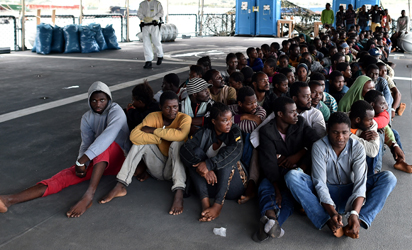Cost of Human Trafficking

It ought to concern every person, because it is a debasement of our common humanity. It ought to concern every community, because it tears at our social fabric. It ought to concern every business, because it distorts markets. It ought to concern every nation, because it endangers public health and fuels violence and organized crime. I’m talking about the injustice, the outrage, of human trafficking, which must be called by its true name—modern slavery.” Nothing seems to have captured the endemic nature and threats human trafficking poses to global peace and humanity as a whole than the quote above by the former President of the United States of America.
Human trafficking, according to Wikipedia, is the trade of humans for the purpose of forced labour, sexual slavery, or commercial sexual exploitation for the trafficker or others. The act may encompass providing a spouse in the context of forced marriage, or the extraction of organs or tissues, including for surrogacy and ova removal. Ever since a CNN investigation produced footage of West Africans being sold at slave markets in Libya, human trafficking, a dehumanizing act, to say the least, has generated wild outrage to the conscience of humanity. Sadly, the heinous practice is big business, generating returns on investments that almost competed with the GDP of the entire West African countries in 2014, excluding Nigeria. More alarming statistics, according to experts, is that 71 per cent of trafficking victims in the world are “women” and “girls” while children made of 21 per cent of victims forced into commercial sexual exploitation. Trafficking in persons is a big global problem, but even much more, it is a big global business connecting different facets of a supply chain of transnational organized crimes. Figures released by the International Labour Organisation (ILO) in 2014 on the profits and poverty that emanate from the economics of forced labour, according to Mrs. Stella Odife, a human rights activist, showed that trafficking in persons, which is the major vehicle for bringing victims into forced labour, earns an estimated $150 billion (USD) a year for traffickers and beneficiaries, with two-thirds of the profit pie generated from forced sexual exploitation. Considering that human trafficking is the major gateway to modern slavery, its expanded dimensions ought to be given serious attention in Nigeria, Africa and elsewhere in the world. It is against this background that two professional international associations—Pontifical Academy of Social Sciences (PASS) and the Global Alliance for Legal Aid (GALA)), both of which are deeply concerned about the well being of trafficked people, hosted a workshop in the Vatican city of Rome between November 4 – 6 2017, with the title: “Assisting victims of Human Trafficking: Best Practices in Legal Aid, Compensation and Resettlement.” The gathering aimed to inspire spiritual and practical action by all global faiths and people of goodwill everywhere to eradicate modern slavery across the world by 2020 and for all time. It recognized also that in the eyes of God, each human being is a free person destined to exist for the good of all in equality and fraternity. Modern slavery, in terms of human trafficking, forced labour and prostitution, organ trafficking, and any relationship that fails to respect this fundamental conviction, is therefore a crime against humanity, participants from all parts of the world, maintained at the workshop. And for victims to flourish as persons, whose human dignity has been fully restored and who can play a full role in society, much more is required than moral condemnation of the heinous practice. More is needed than ratification of international agreement and national legislation for their implementation. Victims must be resettled and integrated into the communities. The Women Organisation for Gender Issues (WOGI), a Nigeria non government organization (NGO) represented on the occasion by its founder, Mrs. Odife, who is also a former deputy governor of Anambra State, looked at trafficking of persons in Nigeria and attempted to answer the question, which formed the theme of the workshop—Quo Vadis?—a Latin expression that translates as, ‘Where are we going?’ In examining the nature of trafficking in human persons in Nigeria and the progress recorded so far, Odife believes a successful battle and war against trafficking in persons in Nigeria can only be attained when country specific policies and programmes are designed to combat, and where possible, eradicate the 8-key enablers of human trafficking in Nigeria, which she listed as corruption; family support mechanism; poor funding of anti-trafficking agencies and initiatives. Others are poor data base maintenance on trafficking activities; local culture in rural areas; porous educational system and curriculum; decadence of moral order and values; and abject multidimensional poverty. Fact remains that when all these 8-key enablers of trafficking are reviewed, answer to the question Quo Vadis would be that Nigeria remains a work in progress. And as Mrs. Odife would insist, more could have been and can still be achieved to nip this trade of debasing of our common humanity in the bud.
